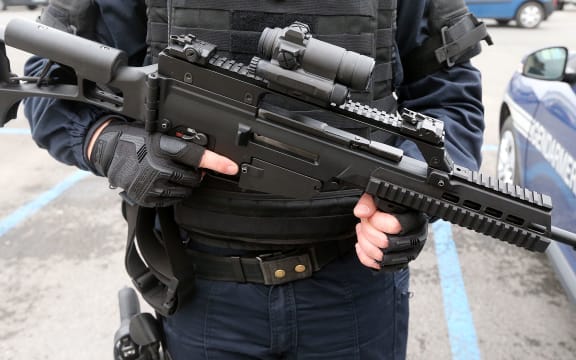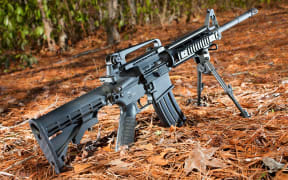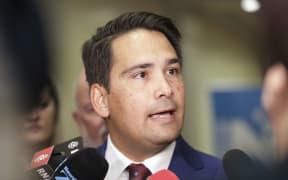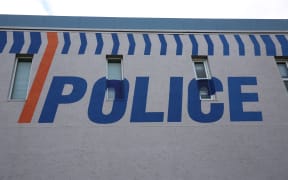Banning military-style semi-automatic weapons and assault rifles has seen a sweeping show of unity across the political divide.

ACT leader David Seymour Photo: VNP / Daniela Maoate-Cox
But the ACT Party isn't pledging its support yet. Leader David Seymour worries the government is playing into the hands of the terrorist by rushing to change New Zealand in the wake of his attack.
"You do not defy terrorism and defend our democracy by throwing out democratic procedure such as parliamentary scrutiny and the public's right to submit in full, at the first sign of trouble," he said.
He's worried about the government's plan to give just one week to hear public submissions, with three weeks until the ban becomes law.
By 11 April, it will be illegal to possess a military-style semi-automatic weapon or an assault rifle. The government ban also applies to high-capacity magazines and the parts that can upgrade weapons to make them generate automatic gunfire.

Use of assault rifles in New Zealand will be banned by law by next month. Photo: AFP
"In short, every semi-automatic weapon used in the terrorist attack on Friday, will be banned in this country," Prime Minister Jacinda Ardern said.
She has no qualms pushing the changes through under urgency. "A shortened select committee process will apply, so I encourage all those who wish to submit, to start now."
Read more:
- Follow today's live updates
- 'They are us': Read about the victims
- RNZ's full coverage of the terror attack and the response to it
- PM urges people to pay respects as nation officially mourns
- World reacts to gun law change in NZ
Mr Seymour wants to read the full legislation before deciding how he will vote.
He also wants the public to have the opportunity to help shape the law changes - as normally happens - and Parliamentarians to then debate the changes.
Mr Seymour said rushing the laws through unscrutinised would run the risk they would not have the desired effect.
"We're missing out on the opportunity to make better laws and have more details come to light about how we can do better," he said.
"But we're also, symbolically, allowing the terrorist to achieve his goal and dishonouring the victims by changing New Zealand away from a place that has a sober law-making process with parliamentary scrutiny and public input, and rushing things through at the first sign of trouble.
"I don't think that's a good way to respond."
Bridges hesitant over timeframe
National leader Simon Bridges isn't sold that a one-week select committee is long enough either, saying "we want to get it right the first time, we want that detail to be technically correct."
But he said he understands the need for urgency on this and supports the government's moves.
"I think now is a time for unity in New Zealand. I think now is a time where we've got to act in the national interest to make sure that New Zealanders are safe," he said.
Labour adamant over ban, will explore further measures
Police Minister Stuart Nash however told Morning Report that Labour, under the Prime Minister's leadership, was moving towards the ban as a necessary first step as quickly as possible.
"When people talk about 'we need more time' John Howard actually had a good line when he responded to those - he said 'this is code for doing nothing'.
"We're prepared to do something. As the Prime Minister has said, this will be passed by the next Parliamentary sitting block.
"The AR15 that the terrorist used to kill 50 Kiwis, it's a civilian version of the M16 which is the weapon used by troops in Vietnam. These are not weapons to shoot or or pigs or ducks or rabbits or possums, these are designed to shoot humans and we want to get rid of them."
He said he very much doubted whether gun lobbies would be able to influence the government on this, as predicted by an Australian reform advocate.
The government would also look at further measures once the ban was fully in place, he said.
"There is a cabinet paper coming out on Monday which looks at other things we can do around the Arms Act - a register is something that we will consider but Cabinet has not made any decisions on that at this point."
He gave some further detail on the proposals, noting that not all semi-automatics would be banned.
"We're making a couple of exceptions, one of them is your rim-fire 22-calibre rifle with a maximum of 10-shot mag - this is a tool of the trade for many farmers - and we're also saying that the semi-automatic and pump-action shotguns with a non-detachable magazine with a maximum of five rounds, and this is the [firearm] of choice for 100,000 kiwis who go duckshooting every year."
He said the interim measures allowed people with a Category E gun licence to keep military-style, semi-automatics and assault rifles, but once the full ban was enacted in Parliament they would have to be handed in.
The buyback was estimated by Ministry of Finance to cost between $100m and $200m, he said, but full costs would be hard to determine.
"We have no idea how many of these assault rifles are actually out there because you haven't needed a special licence to buy them."
Responding to criticism that the ban would simply push weapons into a black market, he said he did not think New Zealanders wanted these weapons in the hands of gangs.
"Guns are available to criminals at the moment and it's something police is grappling with, but what I would say is the vast majority of New Zealanders are law abiding citizens, there's a reason we're going to offer them a fair and reasonable price for their firearms."
Both the Green Party and New Zealand First have released statements in support of the changes, having agreed to them at Cabinet on Monday.






